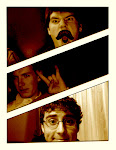What the hell is a moveable feast (yes, besides Paris). More specifically, why those words?
I've never read A Moveable Feast, so give me some context for what that means in the book's context. If I had to guess, though, it sounds scrumptious.
I've never read A Moveable Feast, so give me some context for what that means in the book's context. If I had to guess, though, it sounds scrumptious.
Well, in the context of the book, a moveable feast refers to constant social movement within groups of friends. College is one big moveable feast. Say you started in your room, then called Matt and I, and we'd go to Travis's room, or SMFA, or some such place, collecting people as we went. That's what Hem was referring to, the fact that he was constantly traveling to people's houses and socializing. I like the wording. When you think of a feast you think of one fixed place, but I think he was referring to far more than food, with people you also dine on ideas, laughter, shared experience, ect, none of which are fixed by location but are incredibly filling mentally, emotionally, and spiritually.
Why are trip-hop/ambient drummers so good/creative - as generally opposed to the average rock drummer - when they don't have to be [as much/in general]? (I just listened to Third by Portishead & now the unpronouncable latest Sigur Ros album).
The drummers in non-rock based genres serve a diferent purpose in their bands. A rock drummer, at his base, is the backbone of a song. Barring the occasional experimental rawk band, no matter how good you are, you're still providing a variation on 4/4 for the rest of your band to follow along to, with their vastly more important instrumentvocals. Triphop and ambient, on the other hand, thrive and survive based on the surreal drum patterns - the drummer isn't the backbone of the band for those genres, they're the heartbeat.
The drummers in non-rock based genres serve a diferent purpose in their bands. A rock drummer, at his base, is the backbone of a song. Barring the occasional experimental rawk band, no matter how good you are, you're still providing a variation on 4/4 for the rest of your band to follow along to, with their vastly more important instrumentvocals. Triphop and ambient, on the other hand, thrive and survive based on the surreal drum patterns - the drummer isn't the backbone of the band for those genres, they're the heartbeat.
Yea...what Matt said
What is the positive artistic significance of a horror movie (from the perspective of the director and actor, or of the intellectual audience member)?
To evoke intense feelings from the audience that would otherwise be literally impossible to evoke otherwise. It's the artistic equivalent of performance art where someone "murders" themselves, because it triggers that visceral reaction.
To evoke intense feelings from the audience that would otherwise be literally impossible to evoke otherwise. It's the artistic equivalent of performance art where someone "murders" themselves, because it triggers that visceral reaction.
On top of that it allows to observe the situation from behind safety glass, if you will. One of the major enjoyments of horror movies (like Zombie flicks) is that you can place yourself in these situations and ask yourself how you would react. Would you be the one who freaks out and splits from the group, or would you be the latent leader to tries to get everyone out alive? It allows a strange type of self-reflection to take place.
What is the positive artistic significance of a game show?
There isn't. Haven't you heard the opening monologue of Trainspotting?
There isn't. Haven't you heard the opening monologue of Trainspotting?
I've always wanted to see Trainspotting.
I think it's a shared cultural experience. A passive IQ test (remember, IQ tests test for cultural awareness not actual intelligence) that you can take alone or with friends. It gives a sense of self-gratification. How this is artistic I'm not sure.
Why is blue so awesome? Is it just me?
I'll talk about the SCIENCE of why blue is so awesome soon.
I'll talk about the SCIENCE of why blue is so awesome soon.
The real question is, why is green so awesome? And I know it's not just me.

No comments:
Post a Comment